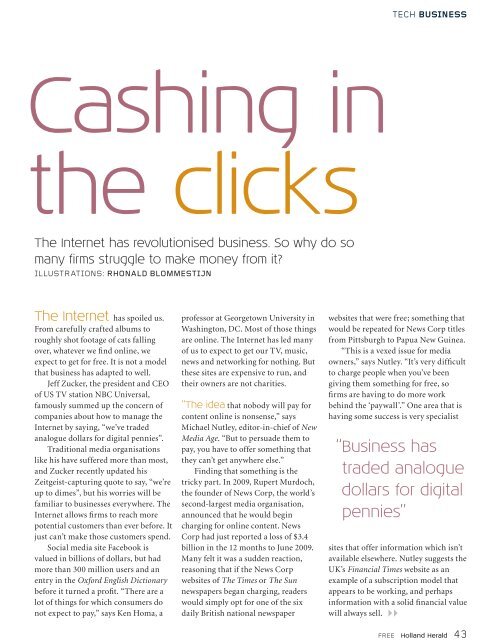may-2010
may-2010
may-2010
You also want an ePaper? Increase the reach of your titles
YUMPU automatically turns print PDFs into web optimized ePapers that Google loves.
Cashing in<br />
the clicks<br />
The Internet has revolutionised business. So why do so<br />
many fi rms struggle to make money from it?<br />
ILLUSTRATIONS: RHONALD BLOMMESTIJN<br />
The Internet has spoiled us.<br />
From carefully crafted albums to<br />
roughly shot footage of cats falling<br />
over, whatever we fi nd online, we<br />
expect to get for free. It is not a model<br />
that business has adapted to well.<br />
Jeff Zucker, the president and CEO<br />
of US TV station NBC Universal,<br />
famously summed up the concern of<br />
companies about how to manage the<br />
Internet by saying, “we’ve traded<br />
analogue dollars for digital pennies”.<br />
Traditional media organisations<br />
like his have suffered more than most,<br />
and Zucker recently updated his<br />
Zeitgeist-capturing quote to say, “we’re<br />
up to dimes”, but his worries will be<br />
familiar to businesses everywhere. The<br />
Internet allows fi rms to reach more<br />
potential customers than ever before. It<br />
just can’t make those customers spend.<br />
Social media site Facebook is<br />
valued in billions of dollars, but had<br />
more than 300 million users and an<br />
entry in the Oxford English Dictionary<br />
before it turned a profi t. “There are a<br />
lot of things for which consumers do<br />
not expect to pay,” says Ken Homa, a<br />
professor at Georgetown University in<br />
Washington, DC. Most of those things<br />
are online. The Internet has led many<br />
of us to expect to get our TV, music,<br />
news and networking for nothing. But<br />
these sites are expensive to run, and<br />
their owners are not charities.<br />
“The idea that nobody will pay for<br />
content online is nonsense,” says<br />
Michael Nutley, editor-in-chief of New<br />
Media Age. “But to persuade them to<br />
pay, you have to offer something that<br />
they can’t get anywhere else.”<br />
Finding that something is the<br />
tricky part. In 2009, Rupert Murdoch,<br />
the founder of News Corp, the world’s<br />
second-largest media organisation,<br />
announced that he would begin<br />
charging for online content. News<br />
Corp had just reported a loss of $3.4<br />
billion in the 12 months to June 2009.<br />
Many felt it was a sudden reaction,<br />
reasoning that if the News Corp<br />
websites of The Times or The Sun<br />
newspapers began charging, readers<br />
would simply opt for one of the six<br />
daily British national newspaper<br />
TECH BUSINESS<br />
websites that were free; something that<br />
would be repeated for News Corp titles<br />
from Pittsburgh to Papua New Guinea.<br />
“This is a vexed issue for media<br />
owners,” says Nutley. “It’s very diffi cult<br />
to charge people when you’ve been<br />
giving them something for free, so<br />
fi rms are having to do more work<br />
behind the ‘paywall’.” One area that is<br />
having some success is very specialist<br />
“Business has<br />
traded analogue<br />
dollars for digital<br />
pennies”<br />
sites that offer information which isn’t<br />
available elsewhere. Nutley suggests the<br />
UK’s Financial Times website as an<br />
example of a subscription model that<br />
appears to be working, and perhaps<br />
information with a solid fi nancial value<br />
will always sell.<br />
FREE Holland Herald 43
















